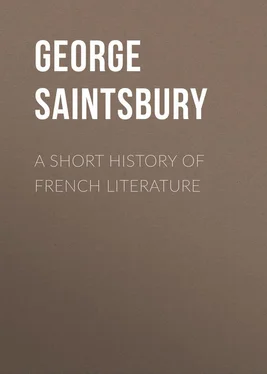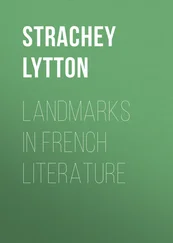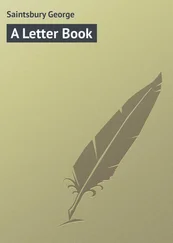George Saintsbury - A Short History of French Literature
Здесь есть возможность читать онлайн «George Saintsbury - A Short History of French Literature» — ознакомительный отрывок электронной книги совершенно бесплатно, а после прочтения отрывка купить полную версию. В некоторых случаях можно слушать аудио, скачать через торрент в формате fb2 и присутствует краткое содержание. ISBN: , Жанр: foreign_prose, на английском языке. Описание произведения, (предисловие) а так же отзывы посетителей доступны на портале библиотеки ЛибКат.
- Название:A Short History of French Literature
- Автор:
- Жанр:
- Год:неизвестен
- ISBN:http://www.gutenberg.org/ebooks/33062
- Рейтинг книги:3 / 5. Голосов: 1
-
Избранное:Добавить в избранное
- Отзывы:
-
Ваша оценка:
- 60
- 1
- 2
- 3
- 4
- 5
A Short History of French Literature: краткое содержание, описание и аннотация
Предлагаем к чтению аннотацию, описание, краткое содержание или предисловие (зависит от того, что написал сам автор книги «A Short History of French Literature»). Если вы не нашли необходимую информацию о книге — напишите в комментариях, мы постараемся отыскать её.
A Short History of French Literature — читать онлайн ознакомительный отрывок
Ниже представлен текст книги, разбитый по страницам. Система сохранения места последней прочитанной страницы, позволяет с удобством читать онлайн бесплатно книгу «A Short History of French Literature», без необходимости каждый раз заново искать на чём Вы остановились. Поставьте закладку, и сможете в любой момент перейти на страницу, на которой закончили чтение.
Интервал:
Закладка:
As examples of this prose literature we may take a fragment of one of the sermons attributed to St. Bernard (twelfth century), an extract from Aucassin et Nicolette (thirteenth century), and one from the Curial of Alain Chartier (early fifteenth century): —
Granz est ceste mers, chier frere, et molt large, c'est ceste presente vie ke molt est amere et molt plaine de granz ondes, ou trois manieres de gent puyent solement trespesseir, ensi k'il delivreit en soient, et chascuns en sa maniere. Troi homme sunt: Noë, Danïel et Job. Li primiers de cez trois trespesset a neif, li seconz par pont et li tierz par weit. Cist troi homme signifïent trois ordenes ki sunt en sainte eglise. Noë conduist l'arche par mei lo peril del duluve, en cui je reconois aparmenmes la forme de ceos qui sainte eglise ont a governeir. Danïel, qui apeleiz est bers de desiers, ki abstinens fut et chastes, il est li ordenes des penanz et des continanz ki entendent solement a deu. Et Job, ki droituriers despensiers fut de la sustance de cest munde, signifïet lo fëaule peule qui est en marïaige, a cuy il loist bien avoir en possessïon les choses terrienes. Del primier et del secont nos covient or parler, ear ci sunt or de present nostre frere, et ki abbeit sunt si cum nos, ki sunt del nombre des prelaiz; et si sunt assi ci li moine ki sunt de l'ordene des penanz dont nos mismes, qui abbeit sommes, ne nos doyens mies osteir, si nos par aventure, qui jai nen avignet, nen avons dons oblïeit nostre professïon por la grace de nostre office. Lo tierz ordene, c'est de ceos ki en marïaige sunt, trescorrai ju or briément, si cum ceos qui tant nen apartienent mies a nos cum li altre. c'est cil ordenes ki a vveit trespesset ceste grant meir; et cist ordenes est molt peneuous et perillous, et ki vait par molt longe voie, si cum cil ki nule sente ne quierent ne nule adrece. En ceu appert bien ke molt est perillouse lor voie, ke nos tant de gent i vëons perir, dont nos dolor avons, et ke nos si poc i vëons de ceos ki ensi trespessent cum mestiers seroit; ear molt est griés chose d'eschuïr l'abysme des vices et les fossés des criminals pechiez entre les ondes de cest seule, nomeyement or en cest tens ke li malices est si enforciez.
Aucasins fu mis en prison si com vos avés, oï et entendu, et Nicolete fu d'autre part en le canbre. Ce fu el tans d'esté, el mois de mai, que li jor sont caut, lonc et cler, et les nuis coies et series. Nicolete jut une nuit en son lit, si vit la lune luire cler par une fenestre, et si oï le lorseilnol canter en garding, se li sovint d'Aucasin son ami qu'ele tant amoit. ele se comença a porpenser del conte Garin de Biaucaire qui de mort le haoit; si se pensa qu'ele ne remanroit plus ilec, que s'ele estoit acusee et li quens Garins le savoit, il le feroit de male mort morir. ele senti que li vielle dormoit qui aveuc li estoit. ele se leva, si vesti un blïaut de drap de soie que ele avoit molt bon; si prist dras de lit et touailes, si noua l'un a l'autre, si fist une corde si longe conme ele pot, si le noua au piler de le fenestre, si s'avala contreval le gardin, et prist se vesture a l'une main devant et a l'autre deriere; si s'escorça por le rousee qu'ele vit grande sor l'erbe, si s'en ala aval le gardin. Ele avoit les caviaus blons et menus recercelés, et les ex vairs et rïans, et le face traitice et le nés haut et bien assis, et les levretes vermelletes plus que n'est cerisse ne rose el tans d'esté, et les dens blans et menus, et avoit les mameletes dures qui li souslevoient sa vestëure ausi com ce fuissent II nois gauges, et estoit graille parmi les flans, qu'en vos dex mains le pëusciés enclorre; et les flors des margerites qu'ele ronpoit as ortex de ses piés, qui li gissoient sor le menuisse du pié par deseure, estoient droites noires avers ses piés et ses ganbes, tant par estoit blance la mescinete. Ele vint au postic; si le deffrema, si s'en isci par mi les rues de Biaucaire par devers l'onbre, ear la lune luisoit molt clere, et erra tant qu'ele vint a le tor u ses amis estoit. Li tors estoit faëlé de lius en lius, et ele se quatist delés l'un des pilers. si s'estraint en son mantel, si mist sen cief par mi une crevëure de la tor qui vielle estoit et anciienne, si oï Aucasin qui la dedens pleuroit et faisoit mot grant dol et regretoit se douce amie que tant amoit. et quant ele l'ot assés escouté, si comença a dire.
La court, affin que tu l'entendes, est ung couvent de gens qui soubz faintise du bien commun sont assemblez pour eulx interrompre; ear il n'y a gueres de gens qui ne vendent, achaptent ou eschangent aucunes foiz leurs rentes ou leurs propres vestemens; ear entre nous de la court nous sommes marchans affectez qui achaptons les autres gens et autresfoiz pour leur argent nous leur vendons nostre humanité precïeuse. Nous leur vendons et achaptons autruy par flaterie ou par corrupcïons; mais nous sçavons tres bien vendre nous mesmes a ceulx qui ont de nous a faire. Combien donc y peus tu acquerir qui es certain sans doubte et sans peril? veulx tu aller a la court vendre ou perdre ce bien de vertu, que tu as acquis hors d'icelle court? Certes, frere, tu demandes ce que tu deusses reffuser, tu te fies en ce dont tu te deusses deffier et fiches ton esperance en ce que te tire a peril. Et se tu y viens, la court te servira de tant de mensonges controverses d'une part, et de l'autre de bailler tant de tours et de charges que tu auras dedans toy mesmes bataille continuëlle et soussiz angoisseux et pour certain homme qui pourra bonnement dire que ceste vie fust bieneuree qui par tant de tempestes est achatee et en tant de contrarïetez esprouvee.
INTERCHAPTER I
SUMMARY OF MEDIAEVAL LITERATURE
In the foregoing book a view has been given of the principal developments of mediaeval literature in France. The survey has extended, taking the extremest chronological limits, over some eight centuries. But, until the end of the eleventh, the monuments of ancient French literature are few and scattered, and the actual manuscripts which we possess date in hardly any case further back than the twelfth. In reality the history of mediaeval literature in France is the history of the productions of the twelfth, thirteenth, fourteenth and early fifteenth centuries with a long but straggling introduction, ranging from the eighth or even the seventh. Its palmy time is unquestionably in the twelfth and the thirteenth. During these two hundred years almost every kind of literature is attempted. Vast numbers of epic poems are written; one great story, that of Arthur, exercises the imagination as hardly any other story has exercised it either in ancient or in modern times; the drama is begun in all its varieties of tragedy, comedy, and opera; lyric poetry finds abundant and exquisite expression; history begins to be written, not indeed from the philosophic point of view, but with vivid and picturesque presentment of fact; elaborate codes are drawn; vernacular homilies, not mere rude colloquial discourses, are composed; the learning of the age, such as it is, finds popular treatment; and in particular a satiric literature, more abundant and more racy if less polished than any that classical antiquity has left us, is committed to writing. It is often wondered at and bewailed that this vigorous growth was succeeded by a period of comparative stagnation in which little advance was made, and in which not a little decided falling off is noticeable. Except the formal lyric poetry of the fourteenth and early fifteenth centuries, and the multiplied dramatic energy of the latter, nothing novel or vigorous appears for some hundred and forty years, until the extreme verge of the period, when the substitution of the prose tale, as exemplified in the work attributed to Antoine de la Salle, for the verse Fabliau, opens a prospect which four centuries of progress have not closed. The early perfection of Italian, a language later to start than French, has been regretfully compared with this, and the blame has been thrown on the imperfection of mediaeval arrangements for educating the people. The complaint is mistaken, and almost foolish. It is not necessary to look much further than Italian itself to see the Nemesis of a too early development. French, like English, which had a yet tardier literary growth, has pursued its course unhasting, unresting, to the present hour. Italian since the close of the sixteenth century has contributed not a single masterpiece to European literature, and not much that can be called good second-rate. It is not impossible that the political troubles of France – the Hundred Years' War especially – checked the intellectual development of the country, but if so, the check was in the long run altogether salutary. The middle ages were allowed to work themselves out – to produce their own natural fruit before the full influx of classical literature. What is more, a breathing time was allowed after the exhaustion of the first set of influences, before the second was felt. Hence the French renaissance was a far more vigorous growth than the renaissance of Italy, which displays at once the signs of precocity and of premature decay. But we are more immediately concerned at the present moment with the literary results of the middle ages themselves. It is only of late years that it has been possible fully to estimate these, and it is now established beyond the possibility of doubt that to France almost every great literary style as distinguished from great individual works is at this period due. The testimony of Brunetto Latini as to French being the common literary tongue of Europe in the thirteenth century has been quoted, and those who have read the foregoing chapters attentively will be able to recall innumerable instances of the literary supremacy of France. It must of course be remembered that she enjoyed for a long time the advantage of enlisting in her service the best wits of Southern England, of the wide district dominated by the Provençal dialects, and of no small part of Germany and of Northern Italy. But these countries took far more than they gave: the Chansons de Gestes were absorbed by Italy, the Arthurian Romances by Germany; the Fabliaux crossed the Alps to assume a prose dress in the Southern tongue; the mysteries and miracles made their way to every corner of Europe to be copied and developed. To the origination of the most successful of all artificial forms of poetry – the sonnet – France has indeed no claim, but this is almost a solitary instance. The three universally popular books (to use the word loosely) of profane literature in the middle ages, the epic of Arthur, the satire of Reynard the Fox, the allegorical romance of the Rose, are of French origin. In importance as in bulk no literature of these four centuries could dare to vie with French.
Читать дальшеИнтервал:
Закладка:
Похожие книги на «A Short History of French Literature»
Представляем Вашему вниманию похожие книги на «A Short History of French Literature» списком для выбора. Мы отобрали схожую по названию и смыслу литературу в надежде предоставить читателям больше вариантов отыскать новые, интересные, ещё непрочитанные произведения.
Обсуждение, отзывы о книге «A Short History of French Literature» и просто собственные мнения читателей. Оставьте ваши комментарии, напишите, что Вы думаете о произведении, его смысле или главных героях. Укажите что конкретно понравилось, а что нет, и почему Вы так считаете.












